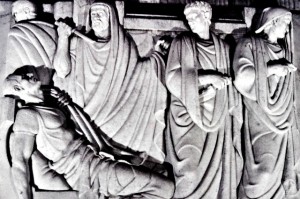You have no items in your cart. Want to get some nice things?
Go shopping
“Stoop then, and wash. How many ages hence this our lofty scene be acted o’er.
In States unborn and accents yet unknown!” [Julius Caesar, Act 3 Scene I].
Shakespeare, in all his creative genius could not possibly have imagined that those words he wrote for Cassius would prove so prophetic. For, eighteen or twenty generations later, the words were being recited on a stage in an accent that Shakespeare could not have dreamt of, and in a setting that, ironically, was commemorating the closing chapters of an Empire that had given him voice. Another irony was that the language of the Sierra Leonean writer, Thomas Decker, in which Julius Caesar was being re-staged may well have had as long a history as that of the playwright`s himself. For, was it not that other Elizabethan and pioneer of the slave trade, John Hawkins, who was among the first to bring the Queen’s language to those parts from which, during the second Elizabethan age, the empire was now retreating? One can imagine, just, Hawkins declaiming to the local citizenry, in blank verse, that the trans-Atlantic voyage on which he was about to take them was no different from a pleasure cruise. Whether they believed him or not is uncertain but linguists and historians now argue that the ancestral language from which present-day Sierra Leone Krio emerged was probably, partly, a derivative of a hybrid of the English and other languages being spoken along the West African coast in the sixteenth and seventeenth centuries, and which returned, modified, after passage to America and transit through the Canadian Maritimes.
By the time in 1792 when the Black Loyalists from Nova Scotia arrived in Freetown, the city that was established to settle them, and which was to develop into Sierra Leone’s capital, the foundation of the Krio language had been set, deriving much of its ingredients from English, remembered Portuguese and French and spiced with a dab or two of American vulgarisms.
Language, combined with a number of other circumstances, persuaded the newly settled Nova Scotians that they were indeed a chosen people. They communicated with God in their own language, although God, through the Bible, communicated back with them in English. And it was in English too, that the Nova Scotians had to negotiate their way around the dominant power structure. And the better they were at speaking the King’s language, the more qualified they were to receive the few plums the authorities were prepared to hand out. Of course, the language spoken by the Nova Scotians subsequently had evolved substantially under pressure from not only local African languages but foreign ones as well, when other West Africans, recaptured from slave ships transporting them to America, were landed at Freetown following Britain’s law abolishing the slave trade in 1808.
So, the language spoken by mid-twentieth century Krio of Sierra Leone, Krio, would almost certainly not have been recognizable by the original Nova Scotians. And this evolved language was the language that caused Thomas Decker so much trouble because he never stopped being surprised that the educated Krio found it difficult to accept it as a legitimate medium of polite conversation. Decker was to rubbish this educated Krio type in a short satirical sketch Boss Coker befo St Peter in which Boss Coker of the title presented himself at the gates of heaven where St Peter stood guard, checking the credentials of all who would enter. Boss Coker, being the well-bred Krio, addressed the gatekeeper in English. But St Peter was somewhat sceptical and decided to test this Black Englishman’s English. Boss Coker failed the test and was, in consequence, deferred entry until he could sort out his identity.
Decker, then editor of the Sierra Leone Daily Guardian was best placed to challenge the pretentious Krio language police. Before that, he had been a school teacher, a profession for which he had been trained at Fourah Bay College, Sierra Leone. And, like most middle class Krio he had received a grammar school education at Freetown’s Church Missionary Society’s Grammar School, where he, like his peers, must have been thoroughly grounded in English. I certainly remember, as a pupil of a subsequent generation at the same school, being given my own measure of Eng Lit, starting with Lambs’ Tales From Shakespeare, “Shakespeare lite”, so to speak, before proceeding to the hard core texts. Some of those lessons were indeed memorable not least because of propositions such as, “Julius Caesar was a Counterblast to Sentimentalism: Discuss”, casually lobbed at us from the masters’ desk up front. In retrospect, what more confirmation was needed that English Language bombast was indeed a way of life?

And it was this way of life that Thomas Decker was challenging when he called upon his compatriots to consider their language as a legitimate medium not only for conducting ordinary conversation in places as diverse as the fish market, the streets, the shops and the grand parlors, but also as text for conveying complex ideas. The intelligentsia, however, would have none of it. But from his platform as Editor of the Daily Guardian, Decker had a vantage point from which to wage his war against the forces of conservatism. He soon realized however, that he had to up his game and what better way of demolishing the opposition than to take the battle to the citadel, to the holy of literary holies and get The Bard himself to do the talking. By doing Shakespeare in Krio, surely, his detractors would have to concede that the great man was every bit as intelligible in that language as in the original. Decker did precisely this, so that, on that day in 1961 on the eve of Sierra Leone’s independence from Britain, he was able to open eyes and tune ears to the loveliness that was Krio.
Sierra Leone had had a long history of theatre, albeit amateur that had provided a varied and ample fare for an eager Freetown audience. But it was not until 1963 that the first professional performances were given, when the British Council brought the Nottingham Playhouse, with John Neville and a young Judi Dench, to play Shakespeare and Bernard Shaw there. It is not clear how the British Council made the decision to send such big guns to West Africa. Although records show that a tour was first mooted in the late nineteen-fifties, it was not until about five or six years later that the project came to fruition. It is tempting to speculate that the impetus that persuaded a slow-moving bureaucracy to make a decision was the staging of Thomas Decker’s Juliohs Siza in 1961.
Decker’s bibliography does not make clear when he started working on his Krio translation of Julius Caesar, but a typed manuscript must have been available by the late fifties and from which copies were made for the 1961 stage presentation. The translation is full of colloquialisms that resonate with the Krio reader and audience. For example, in act 1 Scene II,
`Kaska` (Casca) mocking the response of some young women when Caesar, just coming round from an epileptic seizure, wondered whether he had done or said anything amiss during his short spell of unconsciousness: “Three or four wenches where I stood,” explained Casca, “cried, ‘Alas, good soul!’ And forgave him with all their heart”. Thomas Decker renders this statement in Krio as “Tri pis-teyl titi den klos mi ala: ‘Oya, gud soul’ En forgive am with ohl den at”.
“Pis-teyl titi“ is a term for young, ingénue girls, used usually with derogatory intent and, in this context, conveys Casca’s lack of respect for not only the wenches, but of course, for Caesar as well.
But to return to Cassius, with whom I opened this essay, it had never occurred to me how manipulative this envious conspirator was, until I read Decker’s Krio translation and saw him for the Iago-like figure he truly was.
Thomas Decker remained in the information business for most of his life moving from independent private media to government information officer, where in due time he became the Government of Sierra Leone`s Chief Information Officer. But, in addition to his government sanctioned releases, he continued his writing and translations including one of As You Like It (Udat The Kiap Fit) and of the Sonnets. Unavoidably, in an emerging democracy life can be hazardous for a prolific writer with a high media profile. Inevitably, therefore, Decker got caught up in one of the tumultuous political events that bedevil such societies. In a scenario of almost Shakespearean proportions, Decker was arrested, with others, tried, convicted and sentenced to death for treason. His death sentence was quashed on appeal, but it was never clear what he was really guilty of. It is noteworthy that in his final statement at his trial he denied involvement in no particular crime and it is left for this writer to speculate that anyone who dabbles in Shakespeare, particularly in a play involving violent overthrow of a leader must be asking for trouble, especially in one in which the term “ohnareybul“ is used repeatedly, with such devastating effect in showing how dishonorable men can be when they are in pursuit of power.


About George Tregson Roberts
George Tregson Roberts is a Freetown-born Sierra Leonean, educated during the sixties at Fourah Bay College and at Newcastle University, where he studied medicine. After retirement as a Consultant Haematologist, he turned to freelance writing among other pursuits and now spends his year with his wife between Toronto, London, and West Africa.



